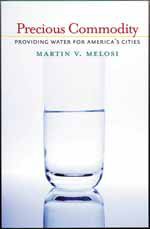SEJournal Online is the digital news magazine of the Society of Environmental Journalists. Learn more about SEJournal Online, including submission, subscription and advertising information.

BookShelf
Precious Commodity: Providing Water for America's Cities
By Martin V. Melosi
University of Pittsburgh Press
Reviewed by CAROLYN JOHNSEN
Martin Melosi’s most recent book, Precious Commodity, explores the history of efforts to provide pure water and adequate sanitary systems to America’s cities, a process fraught with politics and favoritism and complicated by the frequent conflict between economic benefits and human need.
Melosi, a history professor at the University of Houston, does an adequate job of examining the effects of this conflict in selected U.S. cities. In the process, Melosi also explains the historical factors that led some cities to choose privately owned water and sewer systems over publicly owned utilities.
Although the book’s content is history and not advocacy, Melosi notes the problems inherent in viewing water as a “commodity,” a prominent attitude among policymakers and elected officials who have frequently been more diligent in providing water for industrial and economic purposes than for people of all income levels and races.
Melosi points out that those who control water are as important as those who get the water and how the water is used. In the process, he raises important questions about the human right to fresh water.
However, Precious Commodity lacks a clear narrative line and human voices. The author seems to be writing for other historians and public-works officials rather than for the general public, and so tends toward the abstract.
But for readers with the common expectations of city dwellers (pure water from every tap, a sewer system that carries waste away and treats it properly, adequate water for gardening and fire fighting alike), Precious Commodity provides a fine, broad context.
The information on growing human needs for water worldwide is especially useful in this respect. In examining the frequent assertions that the world faces “a water crisis,” and “water is the next oil,” Melosi wrote that “reliance on water goes much deeper into history than dependence on oil. Truth be told, ‘water is the next water’ — if such a phrase makes any sense at all.”
It is for this very history of U.S. municipalities’ search for water that many readers will value this book.
SEJ member Carolyn Johnsen is writing a book about the history of the Ogallala Aquifer in Nebraska, and has written about factory hog farms and about communication for scientists.
* From the quarterly newsletter SEJournal, Spring 2012. Each new issue of SEJournal is available to members and subscribers only; find subscription information here or learn how to join SEJ. Past issues are archived for the public here.













 Advertisement
Advertisement 



